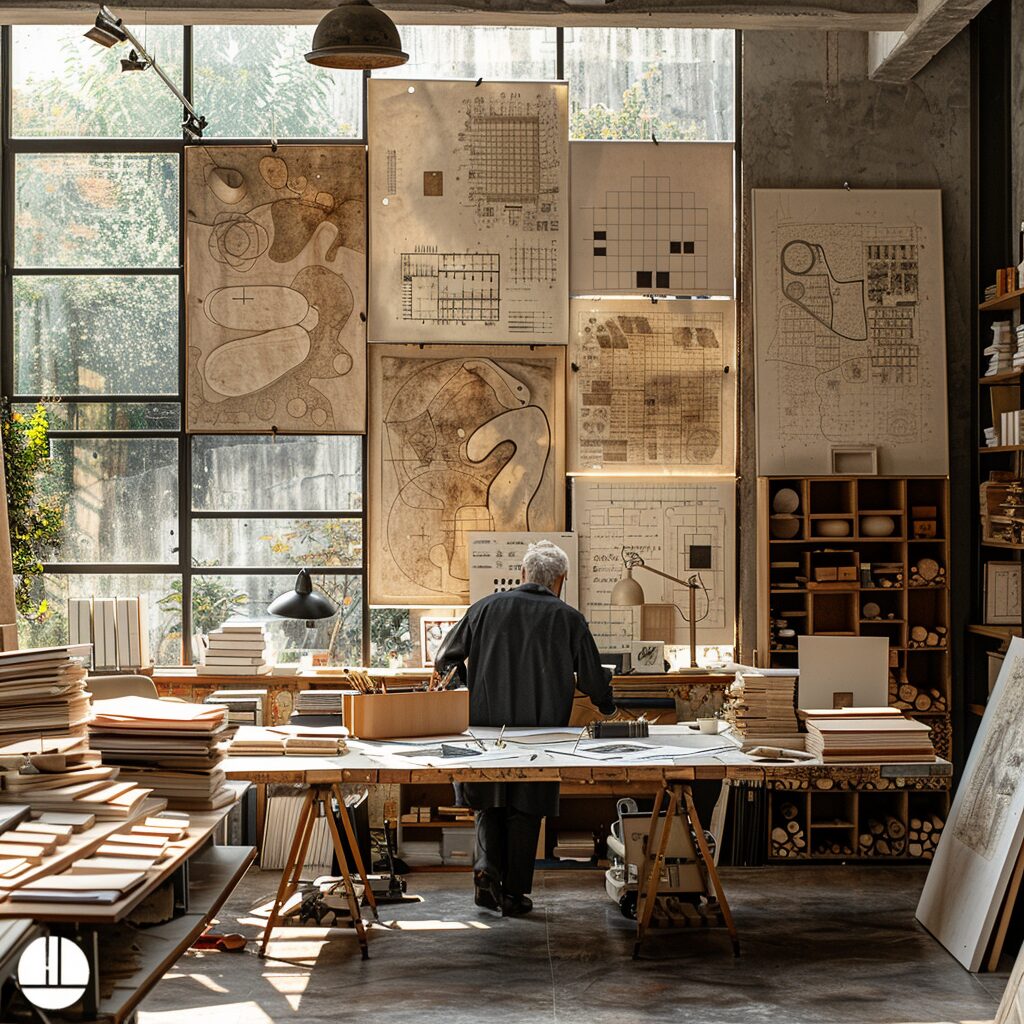What does an Architect in Italy do? Why you need one: a detailed guide for the client
Introduction: the role of the architect
Architecture is a discipline that combines art, science, and technology to design and construct buildings and urban spaces that meet human needs, and are functional, aesthetic, and sustainable. The term architecture comes from the Greek architékton, which means “chief builder” or “master builder.” Therefore, the architect is the professional who designs buildings and structures, coordinating the various phases of the construction process and ensuring that every aspect of the project is harmoniously integrated.
The Architect in history
Architects have played a fundamental role throughout history, leaving an indelible mark on different eras and cultures. In ancient civilizations, such as those of Egypt and Mesopotamia, architects were often considered sacred figures responsible for the construction of temples and monuments. During the classical era, architects like Vitruvius codified the principles of architecture, establishing canons that still influence architectural practice today.
The Three Principles of Vitruvius
According to Vitruvius, one of the most influential architects and theorists of antiquity, architecture must be based on three fundamental principles: firmitas, utilitas, venustas.
Firmitas (Strength): Buildings must be constructed solidly and durably, withstanding time, weather, and daily use.
Utilitas (Functionality): Each space must be designed to be useful and functional, meeting the practical needs of its occupants.
Venustas (Beauty): Besides strength and functionality, buildings must be beautiful and pleasing to look at, harmoniously integrating into their context.
The benefits of good Work Planning
Efficiency and savings
Good planning is key to avoiding waste of time and money. When a project is planned down to the smallest detail, every phase of the work flows smoothly. For example, imagine discovering during construction that the bathroom’s position is incorrect due to a measurement error. These kinds of problems can cause significant delays and increase costs. An experienced architect foresees these situations and plans in advance, minimizing unforeseen events.
Respecting deadlines
Another great advantage of good planning is meeting deadlines. Building or renovating a house is often a long and complex process that involves various professionals and suppliers. Without accurate planning, downtime can accumulate, causing delays. An architect coordinates all stages of the project, ensuring that each operation is carried out on schedule, avoiding the risk of living with an open construction site for months.
Resource optimization
Careful management of resources is crucial to ensuring the project’s sustainability. An architect plans the use of materials and energy resources efficiently, reducing waste and improving the overall quality of the work. This approach is not only beneficial for the environment but also helps contain costs.
The Importance of an accurate design
Quality and details
A well-done project is the result of accurate design. Every detail, from the layout of the interior spaces to the choice of materials, is designed to ensure the highest quality. An experienced architect knows that even the smallest detail can make the difference between a mediocre construction and an excellent one. For example, correct space design can improve a home’s functionality and comfort, making it more enjoyable to live in.
Customization
Every client has unique needs and desires. A good architect can interpret these needs and translate them into a customized project. This means that your home will not just be a place to live, but a reflection of your personality and lifestyle. Whether you prefer a modern and minimalist style or a more traditional design, an architect will know how to realize your vision.
Innovation and sustainability
Another fundamental aspect of accurate design is innovation. An architect up-to-date with the latest trends and technologies can propose innovative solutions that improve the project’s energy efficiency and sustainability. For example, integrating low-energy heating systems or using eco-friendly materials can make a big difference in terms of environmental impact and long-term costs.
Vision beyond the obvious
An architect is a professional who, thanks to their sector knowledge and experience, can see what the client alone cannot see or know. Often clients have a limited view of a project’s possibilities. The architect’s job is to broaden the client’s perspective, offering alternative scenarios and innovative solutions that the client might not have considered. This means that a good architect does not merely execute the client’s requests but actively contributes to improving and enriching the project.
The role of the Architect
The Mediator
The architect is not only the designer of your building but also a mediator between you, the client, and the construction company. This role is crucial to ensure that your vision is faithfully realized. The architect supervises the work, ensuring that every phase is carried out according to the project and the expected quality standards. This means you don’t have to worry about errors or deviations from the original plan.
Protecting the client’s interests
During the construction process, there are many decisions to make, some of which can have a significant impact on costs. An architect helps you navigate these choices, proposing solutions that optimize the quality-price ratio. Additionally, the architect’s job is to verify that the materials used comply with specifications and that the work is carried out correctly, thus protecting your financial interests.
Coordination and quality control
Managing a construction project requires coordinating various professionals, such as engineers, surveyors, electricians, and plumbers. The architect acts as the conductor, ensuring that everyone works in synergy and that every aspect of the project is perfectly coordinated. This constant quality control ensures that the final result meets your expectations.
The Architect: not just an interior decorator
A crucial point to clarify is that an architect is not just an interior decorator. While they can certainly handle interior design, their role is much broader and more technical. The architect is a licensed professional authorized to sign projects and submit building permits. This means they can handle all the bureaucratic and administrative aspects necessary to start and complete a construction project in Italy.
Furthermore, the architect can also sign structural calculations, a task often associated with engineers. This makes the architect a complete and versatile figure, capable of coordinating all the figures involved in the construction process. From initial design to site management, the architect ensures that the project is realised following the project plan, timelines, and budget.
Differences between Architect and interior designer
An interesting aspect to consider is the difference between the role of the architect and that of the interior designer. While the architect deals with the structural and functional design of the building, the interior designer focuses on the aesthetics and functionality of the interior spaces. However, these two figures can often coincide, especially in Italy. Many architects have interior design skills and can offer a comprehensive vision that integrates both architectural and decorative aspects. This allows for the creation of coherent and harmonious spaces, where every detail, from structural elements to furnishing accessories, is designed to offer maximum comfort and beauty.
Differences between Architect, Surveyor “Geometra”, and Engineer
The Architect
The architect is a professional specialized in designing spaces and the aesthetics of buildings. They create architectural solutions that are not only functional but also beautiful and pleasant to live in. The architect has training that combines art, science, and technology, allowing them to design buildings that meet client’s needs and harmoniously integrate into the urban or natural context.
The “Geometra” Surveyor
The surveyor is the technician who handles surveys, measurements, and cadastral practices. They are key figures in project realization, providing the technical information necessary for design and construction. The surveyor also prepares topographic plans and technical reports, ensuring that the project complies with current regulations.
The Engineer
The engineer is the professional who handles structural calculations and technical systems. They ensure that the building is safe and technically efficient. The engineer designs load-bearing structures, and electrical, plumbing, and climate control systems, ensuring that everything functions correctly and safely. The collaboration between engineer and architect is fundamental to a project’s success.
Why choose an Architect?
In conclusion, choosing an architect for your project means investing in professionalism, creativity, and safety. An architect not only guides you through the design and construction phases but also ensures that the final result meets your expectations. A well-planned and accurately designed project can significantly improve the quality of life and the value of your investment.
So, the next time you consider building or renovating, remember that the architect is your best ally. Do not hesitate to contact a professional for your next project and discover how collaborating with an architect can turn your dreams into reality.
Happy designing!

